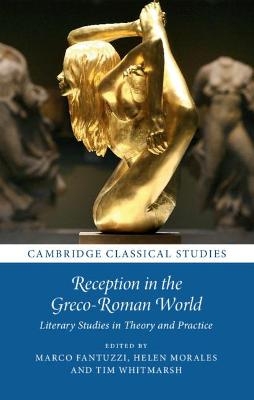
Reception in the Greco-Roman World
Cambridge University Press (Verlag)
978-1-316-51858-8 (ISBN)
The embrace of reception theory has been one of the hallmarks of classical studies over the last 30 years. This volume builds on the critical insights thereby gained to consider reception within Greek antiquity itself. Reception, like 'intertextuality', places the emphasis on the creative agency of the later 'receiver' rather than the unilateral influence of the 'transmitter'. It additionally shines the spotlight on transitions into new cultural contexts, on materiality, on intermediality and on the body. Essays range chronologically from the archaic to the Byzantine periods and address literature (prose and verse; Greek, Roman and Greco-Jewish), philosophy, papyri, inscriptions and dance. Whereas the conventional image of ancient Greek classicism is one of quiet reverence, this book, by contrast, demonstrates how rumbustious, heterogeneous and combative it could be.
Marco Fantuzzi is a Professor of Greek Literature at the University of Roehampton. His most recent book is an edition of the Rhesus attributed to Euripides for Cambridge Classical Texts and Commentaries (2020). Helen Morales is a Professor of Classics at the University of California, Santa Barbara. Her most recent book is Antigone Rising: The Subversive Power of the Ancient Myths (2020). She is co-editor of Ramus: Critical Studies in Greek and Roman Literature. Tim Whitmarsh is the Leventis Professor of Greek Culture at the University of Cambridge. He is the author of over 80 articles and 9 books, including Battling the Gods: Atheism in the Ancient World (2015), and edits the Oxford Classical Dictionary. He is a Fellow of the British Academy.
Introduction Tim Whitmarsh; Section A. Archaic and Classical Poetics: 1. Neighbors and the Poetry of Hesiod and Pindar Anna Uhlig; 2 Stesichorus and the Name Game Richard P. Martin; 3. From Epinician Praise to the Poetry of Encomium on Stone: CEG 177, 819, 888–9, and the Hyssaldomus Inscription Ettore Cingano; 4. Geometry of Allusions: The Reception of Earlier Poetry in Aristophanes' Peace Ioannis M. Konstantakos; Section B. Classical Philosophy and Rhetoric, and their Reception: 5. On Coming After Socrates Laura Viidebaum; 6. Chimeras of Classicism in Dionysius of Halicarnassus' Reception of the Athenian Funeral Orations Johanna Hanink; 7. 'Our Mind went to the Platonic Charmides': The Reception of Plato's Charmides in Wilde, Cavafy and Plutarch Timothy Duff; 8. Naked Apes, Featherless Chickens, and Talking Pigs: Adventures in the Platonic History of Body-hair and other Human Attributes Alastair J. L. Blanshard; Section C. Hellenistic and Roman Poetics: 9. Before the Canon: The Reception of Greek Tragedy in Hellenistic Poetry Annette Harder; 10. Pun-fried Concoctions: Wor(l)d-Blending in the Roman Kitchen Emily Gowers; 11. Powerful Presences: Horace's Carmen Saeculare and Hellenistic Choral Traditions Giovan Battista D'Alessio; Section D. Multimedia and Intercultural Receptions in the Second Sophistic and Beyond: 12. Received into Dance? Parthenius' Erōtika Pathēmata in the Pantomime Idiom Ismene Lada-Richards; 13. Sappho in Pieces Susan A. Stephens; 14. Hesiodic Rhapsody: The Sibylline Oracles Helen Van Noorden; 15. Homer and the Precarity of Tradition: Can Jesus be Achilles? Simon Goldhill.
| Erscheinungsdatum | 04.06.2021 |
|---|---|
| Reihe/Serie | Cambridge Classical Studies |
| Zusatzinfo | Worked examples or Exercises; 7 Tables, black and white |
| Verlagsort | Cambridge |
| Sprache | englisch |
| Maße | 145 x 223 mm |
| Gewicht | 680 g |
| Themenwelt | Geschichte ► Allgemeine Geschichte ► Vor- und Frühgeschichte |
| Geschichte ► Allgemeine Geschichte ► Altertum / Antike | |
| Geisteswissenschaften ► Sprach- / Literaturwissenschaft ► Anglistik / Amerikanistik | |
| Geisteswissenschaften ► Sprach- / Literaturwissenschaft ► Literaturwissenschaft | |
| ISBN-10 | 1-316-51858-2 / 1316518582 |
| ISBN-13 | 978-1-316-51858-8 / 9781316518588 |
| Zustand | Neuware |
| Informationen gemäß Produktsicherheitsverordnung (GPSR) | |
| Haben Sie eine Frage zum Produkt? |
aus dem Bereich


